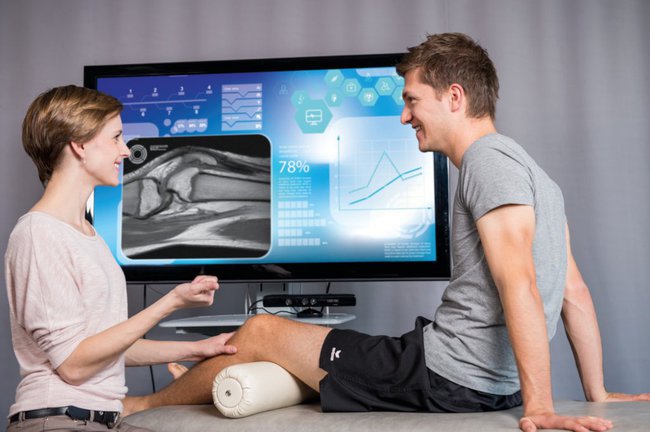Digital Technologies to Improve Rehabilitation
International Project Promotes Training and Competences

The growing share of elderly and chronically ill people in need of care puts pressure on healthcare systems worldwide.
Partner universities from Finland, Germany, Greece, and the Balearic Islands join forces with the St. Pölten University of Applied Sciences to build up digital competences of lecturers, students, and therapists in the field of rehabilitation within the framework of the international project DIRENE to prepare our healthcare systems for the future.
Exploiting Digital Technologies
According to estimates by the World Health Organisation, over 2 billion people will be temporarily or permanently using one or more medical assistance systems by 2050. To meet this demand, it will be necessary to rethink medical care, therapy, and rehabilitation.
Digital technologies can contribute to ensuring long-term quality in rehabilitation. Online appointments allow for rehabilitation that is mobile and can be provided over long distances. Controlled by eye movement, a computer can, for example, take over writing and speaking.
“One option is to increase the use of digital technologies such as Alexa. However, health and social professionals are only able to ensure competent use of these technologies in the rehabilitation of their clients if they can make use of supportive learning offers. The coronavirus pandemic has also demonstrated a demand for people with competences in digital technologies”, says UAS lecturer and physiotherapist Anita Kidritsch of the St. Pölten UAS’ Institute of Health Sciences.
Better Rehabilitation
The project DIRENE supports experts in the healthcare sector in acquiring the necessary skills. “This requires reliable, evidence-based teaching materials, instructions and support to allow for the effective integration of digital technologies into rehabilitation and care. Healthcare professionals not only need to have theoretical knowledge but also the skills to transfer this knowledge into practice and apply it according to the individual requirements”, says Kidritsch.
According to Kidritsch, it is essential to maintain transnational collaborations to enable knowledge transfer on a broader scale and reach out to a large audience by showing use cases and bringing forward new ideas. Around 300 experts contribute their skills to the project DIRENE. The project also involves partners from African countries.
Handbook, Online Course and Study Module
At first, the project explores how to use digital technologies in rehabilitation to improve patient wellbeing, e.g., through apps that record nutrition intake or physical activity. In a further step, the project defines the biggest competence gaps and possible barriers. This, in turn, helps decide how to design learning processes to allow for the successful long-term application of digital technologies in rehabilitation.
The acquired results form the basis for a handbook and a study module, which are supposed to serve as freely available learning materials for lecturers and students. In addition, the project team develops a mobile learning module for those in the healthcare sector who want to know more about the use of digital technologies in rehabilitation.
DIRENE — Building Up Skills and Competences for a New Era of User-Driven and Mobile-Controlled Digital Rehabilitation
The project is supported by the EU within the framework of the Erasmus+ funding programme. The project’s partner institutions are the Finish JAMK University of Applied Sciences (project lead), hsg Bochum — Hochschule für Gesundheit, University of West Attica, and the University of the Balearic Islands.
